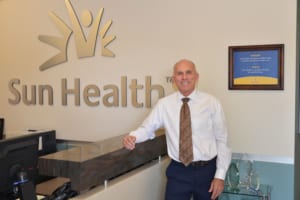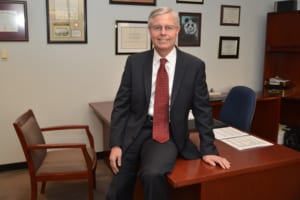Rhonda Forsyth
President and Chief Executive Officer
John C. Lincoln Health Network
How would you characterize the health care industry in the Valley?
When I think of health care for the Valley, for the most part we’ve been a growth industry. We have had incredible new facilities that have been built and new partners that have come into town. … But we’ve also been experiencing the downturn in the economy right now, so we are struggling like every other business, and it’s somewhat concerning. Hospitals in particular have been a safety net for our patients, for families, for our community for quite a long time and that is being threatened because of changes in the economy.
Is the health care industry recession-proof?
A lot of people think health care is recession-proof. From our perspective though, we find that we still have people coming in for services … but many people don’t have the ability to pay for their care, and that is why we’ve experienced a downturn; people can’t pay their co-pays, a lot more people are uninsured, so they still need our services and we are here to provide for them … So, I don’t think we are recession-proof. We’ve gone through changes, we’ve had to reduce expenditures, we’ve had to look very critically at some of the services that we provide and assure that they are still mission critical.
What are the major legislative and financial issues facing the Valley’s health care industry?
Well, it’s unclear right now from a legislative standpoint, both how health care reform is going to manifest itself and then on more of a local level, what’s going to happen … the (state) Senate has passed a bill that includes pretty dramatic payment cuts for hospitals, and also reduces accessibility for many people in our community. There are proposals right now to eliminate coverage for a number of children with KidsCare. So those things are really concerning. However, nothing is in its final form and we don’t know. I would just encourage our legislators and our congressmen to really look at what it is that health care provides in the community and be thoughtful about changes that are being proposed.
What are some of the new trends in health care delivery?
It’s an exciting time to be in health care. … one of the great things that has happened is really bringing biosciences and biotechnology to Arizona, and we have really benefited by having those kinds of partnerships with researchers and with some of our scientists in the community. So, when you look at health care out in the future, you really see the opportunity to treat you as a patient on much more of an individual level, so that, through biosciences, we understand you at a molecular level, rather than just say, ‘Well, you have heart disease and the standard treatment for heart disease is X, Y, Z.’ Now we’re saying … ‘We’re looking at you and molecularly this is how you will respond to this kind of drug or this kind of treatment and we know what will work and what won’t work.’
As baby boomers age, what type of competitive edge does that give local health care facilities?
It does concern me — obviously there’s opportunity — but it does concern me from the standpoint that we have people who have far more diabetes, we’re seeing more incidences of certain types of cancers and heart diseases, and many more chronic diseases. So when you look at baby boomers aging and the incidences of chronic disease, there’s opportunity in treating those people, there’s also concern about it potentially overwhelming the health care system. We’re going to need many more nurses, physicians, facilities, and we’re going to need to be smarter about how we take care of people.
How has health care evolved locally?
The most exciting thing that I’ve seen in health care in Arizona is that providers recognize … that we do a much better job of taking care of patients when we work more closely together. So a lot of our initiatives are really bringing a health care team together to look at you as a patient and say what’s going to make sense through an entire continuum of care, and make sure you get the right treatment at the right time. Also, that we work much more cooperatively with you to do preventative work.
To what do you attribute your success at the C-level?
I think I have a great passion for John C. Lincoln and a great passion for our mission. I feel so honored to come to work every day and to work for people who are really making a difference in people’s lives. … I think I’m also analytical, I like to think strategically, I try to think beyond what are the issues of today, but look to where do I want John C. Lincoln, where do I think we should be five years from now, 10 years from now. I also very much value getting the right person in the right job, and we just have some excellent, excellent people here at John C. Lincoln. While I can look to things where I really feel I’ve made a difference here at John C. Lincoln, I know I’ve done that in the context of a really fabulous team of people.
-
Vital Stats
- Appointed president and CEO of John C. Lincoln Health Network in April 2009
- Joined the network in 1987
- Held executive posts at both network hospitals
- The network includes John C. Lincoln Deer Valley Hospital and John C. Lincoln North Mountain Hospital
- Under her leadership, North Mountain Hospital was recognized for excellent patient care by U.S. News and World Report
- Earned a Maser of Science in business administration from Arizona State University
- Is involved with the Better Business Bureau, the Phoenix Boys Choir and the American Cancer Society




